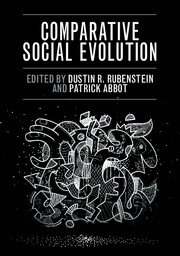Crossref Citations
This Book has been
cited by the following publications. This list is generated based on data provided by Crossref.
Halliwell, Ben
Uller, Tobias
Holland, Barbara R.
and
While, Geoffrey M.
2017.
Live bearing promotes the evolution of sociality in reptiles.
Nature Communications,
Vol. 8,
Issue. 1,
Shen, Sheng‐Feng
Emlen, Stephen T.
Koenig, Walter D.
Rubenstein, Dustin R.
and
Hosken, David
2017.
The ecology of cooperative breeding behaviour.
Ecology Letters,
Vol. 20,
Issue. 6,
p.
708.
Chak, Solomon Tin Chi
Duffy, J. Emmett
Hultgren, Kristin M.
and
Rubenstein, Dustin R.
2017.
Evolutionary transitions towards eusociality in snapping shrimps.
Nature Ecology & Evolution,
Vol. 1,
Issue. 4,
Koenig, Walter D.
2017.
What drives cooperative breeding?.
PLOS Biology,
Vol. 15,
Issue. 6,
p.
e2002965.
Harrison, Mark C.
Jongepier, Evelien
Robertson, Hugh M.
Arning, Nicolas
Bitard-Feildel, Tristan
Chao, Hsu
Childers, Christopher P.
Dinh, Huyen
Doddapaneni, Harshavardhan
Dugan, Shannon
Gowin, Johannes
Greiner, Carolin
Han, Yi
Hu, Haofu
Hughes, Daniel S. T.
Huylmans, Ann-Kathrin
Kemena, Carsten
Kremer, Lukas P. M.
Lee, Sandra L.
Lopez-Ezquerra, Alberto
Mallet, Ludovic
Monroy-Kuhn, Jose M.
Moser, Annabell
Murali, Shwetha C.
Muzny, Donna M.
Otani, Saria
Piulachs, Maria-Dolors
Poelchau, Monica
Qu, Jiaxin
Schaub, Florentine
Wada-Katsumata, Ayako
Worley, Kim C.
Xie, Qiaolin
Ylla, Guillem
Poulsen, Michael
Gibbs, Richard A.
Schal, Coby
Richards, Stephen
Belles, Xavier
Korb, Judith
and
Bornberg-Bauer, Erich
2018.
Hemimetabolous genomes reveal molecular basis of termite eusociality.
Nature Ecology & Evolution,
Vol. 2,
Issue. 3,
p.
557.
Dumke, Marlis
Herberstein, Marie E.
and
Schneider, Jutta M.
2018.
Advantages of social foraging in crab spiders: Groups capture more and larger prey despite the absence of a web.
Ethology,
Vol. 124,
Issue. 10,
p.
695.
Green, Jonathan P.
and
Hatchwell, Ben J.
2018.
Inclusive fitness consequences of dispersal decisions in a cooperatively breeding bird, the long-tailed tit (
Aegithalos caudatus
)
.
Proceedings of the National Academy of Sciences,
Vol. 115,
Issue. 47,
p.
12011.
Cornwallis, Charlie K.
2018.
Cooperative breeding and the evolutionary coexistence of helper and nonhelper strategies.
Proceedings of the National Academy of Sciences,
Vol. 115,
Issue. 8,
p.
1684.
Abbot, Patrick
Tooker, John
and
Lawson, Sarah P.
2018.
Chemical Ecology and Sociality in Aphids: Opportunities and Directions.
Journal of Chemical Ecology,
Vol. 44,
Issue. 9,
p.
770.
Lima, Stella G. C.
Sousa-Lima, Renata S.
Tokumaru, Rosana S.
Nogueira-Filho, Sérgio L. G.
Nogueira, Selene S. C.
and
Higgs, Dennis M.
2018.
Vocal complexity and sociality in spotted paca (Cuniculus paca).
PLOS ONE,
Vol. 13,
Issue. 1,
p.
e0190961.
Leedale, Amy E.
Sharp, Stuart P.
Simeoni, Michelle
Robinson, Elva J. H.
and
Hatchwell, Ben J.
2018.
Fine‐scale genetic structure and helping decisions in a cooperatively breeding bird.
Molecular Ecology,
Vol. 27,
Issue. 7,
p.
1714.
Socias-Martínez, Lluís
and
Kappeler, Peter M.
2019.
Catalyzing Transitions to Sociality: Ecology Builds on Parental Care.
Frontiers in Ecology and Evolution,
Vol. 7,
Issue. ,
Laidre, Mark E.
2019.
Architectural modification of shells by terrestrial hermit crabs alters social dynamics in later generations.
Ecology,
Vol. 100,
Issue. 9,
Kappeler, Peter M.
2019.
A framework for studying social complexity.
Behavioral Ecology and Sociobiology,
Vol. 73,
Issue. 1,
Kappeler, Peter M.
and
Pozzi, Luca
2019.
Evolutionary transitions toward pair living in nonhuman primates as stepping stones toward more complex societies.
Science Advances,
Vol. 5,
Issue. 12,
Josi, Dario
Taborsky, Michael
Frommen, Joachim G.
and
Bshary, R.
2019.
First field evidence for alloparental egg care in cooperatively breeding fish.
Ethology,
Vol. 125,
Issue. 3,
p.
164.
Kappeler, Peter M.
Clutton-Brock, Tim
Shultz, Susanne
and
Lukas, Dieter
2019.
Social complexity: patterns, processes, and evolution.
Behavioral Ecology and Sociobiology,
Vol. 73,
Issue. 1,
Tong, Chao
Najm, Gabriella M
Pinter-Wollman, Noa
Pruitt, Jonathan N
Linksvayer, Timothy A
and
Pisani, Davide
2020.
Comparative Genomics Identifies Putative Signatures of Sociality in Spiders.
Genome Biology and Evolution,
Vol. 12,
Issue. 3,
p.
122.
Downing, Philip A.
Griffin, Ashleigh S.
and
Cornwallis, Charlie K.
2020.
Group formation and the evolutionary pathway to complex sociality in birds.
Nature Ecology & Evolution,
Vol. 4,
Issue. 3,
p.
479.
Kappeler, Peter M.
2020.
Verhaltensbiologie.
p.
277.





